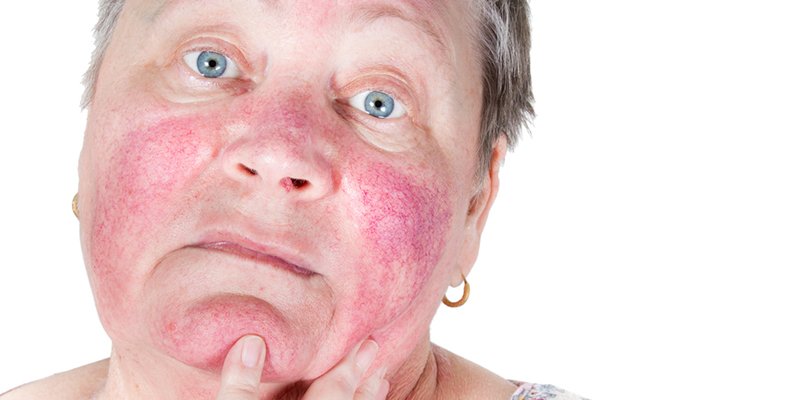The Four Sensitive Skin Subtypes
Sensitive skin and the irritation that can come along with it is a common complaint for millions of people. According to the American Academy of Dermatology, 40 percent of Americans believe that they have some form of sensitive skin, a number that holds true across all age groups. Skin Type Solutions collected data about 27,485 patients from 32 dermatology practices in the U.S. in 2015 and 2016 and found that 73 percent of those patients had at least one form of sensitive skin.
While there are four different types of sensitive skin, they are all caused by inflammation. Skin inflammation is caused when inflammatory factors in the body stimulate the blood vessels to dilate and release water, which leads to redness, swelling and itching. To help explain inflammation, we use the example of INFLA-MAN.
INFLA-MAN™

INFLA-MAN™
INFLA-MAN creates havoc in the body by stimulating various pathways in the body, including the arachidonic acid pathway, cytokines and cells in the immune system. When the INFLA-MAN pathways are turned on, various cells produce inflammatory factors, increase prostaglandin production, turn on genes that can lead to inflammation and cause blood vessels to dilate, leading to redness. Even if you don’t understand how INFLA-MAN causes inflammation, it is important for you to know that INFLA-MAN causes many problems that can lead to “sensitive skin.”
Proper treatment can improve sensitive skin symptoms and successfully defeat INFLA-MAN. The first step is knowing which subtype of sensitivity you suffer from. Many people suffer from one or more types of sensitive skin concurrently.
The Four Subtypes of Sensitive Skin
There are four distinct types of sensitive skin that have one thing in common: inflammation.
- Acne affects millions of Americans, with 11- to 25-year-olds accounting for 70 to 80 percent of patients. Many adult women also suffer from acne as well, due to hormonal fluctuations and imbalances. Acne is characterized by papules, pustules and comedones (whiteheads and blackheads).
- Rosacea affects tens of millions of Americans, but often goes undiagnosed. This progressive condition is typically seen in individuals over 25 years of age, particularly in fair-skinned people, and is characterized by facial flushing, stinging, broken blood vessels and a feeling of facial warmth that comes and goes. It is best to treat rosacea early to prevent its progression. This is an important reason to see your doctor and take the Skin Type Solutions questionnaire so you can be properly diagnosed and get on the proper treatment plan.
- Burning and stinging (neurosensory) is based on sensory symptoms rather than a visible condition. Stinging, itching, burning and related skin discomfort are a class of neurosensory symptoms experienced as a result of triggers affecting sensitive nerve endings. The exact cause of stinging is unknown and varies from person to person.
- Contact dermatitis (allergies and irritants) is more common among people with dry skin. A compromised skin barrier leaves the skin more vulnerable to substances such as allergens, chemicals and other irritants. When these substances penetrate the skin and enter the bloodstream, they provoke an inflammatory reaction.
Treating Sensitive Skin
While no products are available to help with burning and stinging sensations, acne and rosacea can be effectively managed through a wide variety of skincare products and natural treatments. Controlling contact dermatitis can be a trickier proposition, since allergens and irritants in common household products and cleaners, perfumes, cosmetics and even treatments for other skin conditions can trigger a reaction in those with sensitive skin.
Some of the most common culprits that cause allergic reactions in people with sensitive skin include fragrance, preservatives, artificial colors and formaldehyde. In addition, many organic products contain essential oils and fragrances that can lead to contact dermatitis. An example would be organic products containing chamomile, calendula (marigold extract) and feverfew, all of which are reactive allergens that will affect people with ragweed allergies. The following tips can help people with sensitive skin avoid allergic reactions:
- Fragrance is one of the most common allergens in cosmetics, body lotion, bubble bath and laundry detergent, and it causes rashes, redness and scaling. Stop using these products if you experience a reaction.
- Keep an eye out for essential oils. Because some have antimicrobial properties, they are often used as a preservative in fragrance-free products or to add scent.
- Opt for fragrance-free skincare.
- Keep in mind that your favorite perfume can cause the same adverse reactions, and these reactions will happen anywhere you apply the scent.
- If you’re using fragrance-free products and still have reactions, see a dermatologist. You may need a prescription-based treatment to clear up your skin.
In Summary
Managing sensitive skin can be an ongoing lifelong process, but use of anti-inflammatory ingredients can keep INFLA-MAN away. Click here to see a video about facial inflammation (rosacea). See your doctor and get a skincare regimen that is ideal for your subtype (or subtypes) of sensitive skin. Avoid product experimentation, which can increase inflammation, and stick to products prescribed by your doctor. Your sensitive skin will thank you. Stay tuned to learn more about each of these subtypes…
Dr. Leslie Baumann, M.D. and her team at Baumann Cosmetic Dermatology believe in proof, not promises. World-recognized for both cosmetic and general dermatology, our treatment strategies rely exclusively on evidence-based, scientifically verified products and procedures that promote skin health and a natural appearance. We combine effective medical procedures with individualized instruction on proper skincare, nutrition, supplementation and lifestyle in order to maximize the health of the skin and body as a whole while minimizing the effects of aging. For more, visit Dr. Baumann’s blog for daily updates Monday through Friday, or inquire about an appointment through Derm.net.



